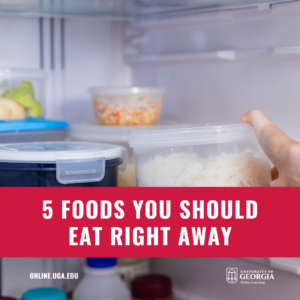5 Foods You Should Eat Right Away
5 Foods You Should Eat Right Away
During the holiday season, many will find themselves in the kitchen cooking. Bringing loved ones together around the dinner table is cause for celebration. Nutritional Sciences play an important role in identifying food safety concerns. Professor in the online Nutritional Sciences program, Tracey Brigman from UGA’s Department of Nutritional Sciences was cited in a recent article advising consumers about leftovers and how long they can safely be kept. To avoid letting the holiday fun end in gastrointestinal illness, make sure to follow this helpful advice when consuming these five foods.
Boiled eggs
Removing an egg’s protective shell invites bacteria to penetrate the pores of the egg. All egg dishes should be eaten the day they are cooked, and they should never be left out at room temp for more than 2 hours. Eggs are particularly susceptible to listeria.
Ground meat
Ground beef can safely last a maximum of two days in the refrigerator. The high levels of humidity in the product make it a magnet for bacteria. E. Coli is already found in the intestines of many animals, and when consumed by humans it can lead to infection. Always cook ground meats thoroughly.
Melon
Professionals say to never buy pre-cut melons from the store. They explained that melons like cantaloupe have unique skin which creates a surface for microbes to attach to. It is impossible to effectively clean the skin, and the inside is the perfect pH to support bacterial growth. One current salmonella outbreak has been linked back to melons.
Raw chicken
Raw chicken should only be kept in the refrigerator for a maximum of one to two days before needing to be cooked or thrown away. It is recommended to keep chicken in the refrigerator for only 4 days after cooking. Contrary to popular habits, rinsing chicken in the sink does not remove bacteria from the meat. Instead, rinsing risks splashing bacteria onto other cooking surfaces. Raw chicken can be kept for up to 9 months in the freezer.
Cooked Rice
Uncooked rice can sit on shelves for months but cooked rice should only be in the refrigerator for one day. Spore-forming bacteria, commonly found in potatoes, peas, beans, and certain spices, begin to grow in cooked rice within a day.
“Cooking does not kill the spores, so if you leave cooked rice or pasta at room temperature, the spores can multiply rapidly and produce a significant amount of toxin”
Awareness of these and other potential food safety concerns can help ensure you and your loved ones avoid foodborne illness this holiday season.
If you find this information interesting and want to learn more about food safety and the research behind these recommendations, an online Nutritional Sciences program could be right for you!
Written by:
